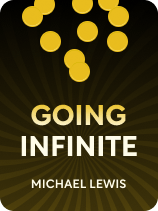
What’s effective altruism? Why did Sam Bankman-Fried adopt this philosophy?
According to biographer Michael Lewis, Sam Bankman-Fried’s effective altruism is rooted in another philosophy that he learned from his parents. Lewis writes about Bankman-Fried’s adoption of this concept and its particular path of “earning to give.”
Keep reading to learn about Sam Bankman-Fried’s effective altruism beliefs and practices.
Sam Bankman-Fried’s Effective Altruism
Effective altruism is a philosophical and social movement that advocates living one’s life in a way that maximizes a net good for humanity. Lewis writes that Sam Bankman-Fried’s effective altruism flowed from his upbringing as a utilitarian—someone who thinks that actions are morally right only if they create the maximum amount of net happiness for everyone. Lewis notes that Bankman-Fried’s parents were utilitarians, and their beliefs clearly rubbed off on Bankman-Fried himself: He was actively participating in online utilitarian message boards at age 12.
(Shortform note: Although Bankman-Fried found utilitarianism appealing, many philosophers have criticized utilitarian moral theories. In particular, these philosophers allege that utilitarianism delivers intuitively incorrect judgments about several moral cases. For example, imagine that a doctor could save the lives of five adults who need organ donations by (discreetly) killing one healthy patient and transplanting his organs to those adults—according to utilitarian calculus, the doctor would likely be obligated to kill the one patient to save the five. But this decision strikes many people as morally abhorrent.)
So, when Oxford philosopher William MacAskill—one of the architects of the effective altruism movement—met Bankman-Fried during the latter’s junior year at MIT, Bankman-Fried immediately bought into his arguments and decided to embrace effective altruism, thus dedicating his life to saving the most lives possible.
(Shortform note: Although MacAskill initially embraced Bankman-Fried as a key member of the effective altruism community, he has since condemned Bankman-Fried for his actions that led to FTX’s downfall. In a series of tweets, MacAskill wrote that, if Bankman-Fried committed fraud as the allegations suggest, then he betrayed the effective altruism community. Moreover, MacAskill clarified that effective altruism emphasizes honesty and integrity, rather than simply thinking that “the ends justify the means,” as Bankman-Fried arguably did.)
However, Lewis points out that, even within the effective altruism movement, there was no consensus on the single best career path for effective altruists. For instance, he notes that, while becoming a doctor and saving lives in rural countries would seem like an appealing option for effective altruists, you could potentially do more good by working in finance and earning enough to subsidize the careers of several doctors in rural countries. Bankman-Fried decided to embrace this notion of earning to give in particular.
(Shortform note: Although effective altruists consider “earning to give” a viable path, they clarify that it’s normally not the most effective path to maximizing value—in fact, they claim that it’s only the optimal path for about 10% of individuals. After all, most individuals aren’t well-suited for high-octane jobs on Wall Street that yield millions of dollars each year. For such individuals, they recommend instead considering careers in communication (in which you convince other people to earn to give), scientific research (in which you can potentially address some of the world’s most pressing problems), or even policymaking positions (in which you work to effect change via the government).)

———End of Preview———
Like what you just read? Read the rest of the world's best book summary and analysis of Michael Lewis's "Going Infinite" at Shortform.
Here's what you'll find in our full Going Infinite summary:
- How Sam Bankman-Fried created an empire—and then destroyed it
- A look at Bankman-Fried's life before he became a crypto mogul
- How effective altruism led Bankman-Fried to his career in finance






